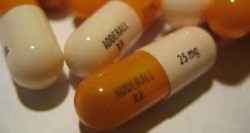Adderall Addiction
The Watershed Addiction Treatment Programs
The Watershed of the Palm Beaches is licensed by the State of Florida and “Gold Seal” accredited by The Joint Commission for alcohol and drug treatment. This symbolizes value and illumines the dedication to meeting industry performance standards. We are a world-class health care facility that offers professional addiction treatment. Just two miles from beautiful Palm Beach County beaches, our rehabilitation center is the perfect setting to emerge refreshed and renewed.
Read More ›Adderall is a medication prescribed for the treatment of attention-deficit disorder, narcolepsy, and obesity. It is a combination of dextroamphetamine and amphetamine, and is a habit-forming drug. Adderall addiction can occur if you take the drug in any way other than as prescribed, or if you take it without being prescribed at all.

When used wrongly, Adderall can lead to dependence and addiction.
Adderall does have legitimate medical uses. However, Adderall abuse is unfortunately common among college students and young professionals, who take it for increased mental concentration or alertness. People are often unaware of the dangers of abusing it, and the fact that it is a habit-forming drug.
How is Adderall Abused?
When taken in any way other than as prescribed, Adderall is being abused. Taking too much of your own prescription, too often, or in a different way is abuse. Taking someone else’s prescription is also Adderall abuse. It is either taken orally or crushed and snorted nasally.
Adderall Side Effects
The Adderall effects that are intended or desired are those of increased energy, wakefulness, concentration, attention and alertness. These effects of Adderall are intended to help people who have serious trouble focusing stay focused and alert, but the medication does have some unintended side effects. These can occur whether you are taking the medication as prescribed or not, though they may be more likely if you are engaging in Adderall abuse.
According to the US National Library of Medicine, Adderall side effects may include:
- Nervousness, restlessness
- Difficulty falling asleep or staying asleep
- Uncontrollable shaking of part of the body
- Headache
- Changes in sex drive or ability
- Dry mouth
- Stomach pain, nausea, vomiting, diarrhea
- Constipation
- Loss of appetite, weight loss
Adderall may cause more serious side effects, too. If you are experiencing any of these side effects you should call your doctor immediately:
- Fast or pounding heartbeat
- Shortness of breath
- Chest pain
- Excessive tiredness
- Slow or difficult speech
- Dizziness or faintness
- Weakness, numbing of arm or leg
- Seizures
- Motor or verbal tics
- Feeling unusually suspicious of others
- Hallucinating
- Aggressive or hostile behavior
- Rash, hives, itching, or blistering of skin
- Difficulty breathing or swallowing
Adderall can cause sudden death in children and teenagers, especially those who have heart problems. It may cause sudden death, heart attack, or stroke in adults. Taking this medication without a prescription puts you at greater risk, seeing as you have not been properly evaluated by a doctor.
Consequences of Adderall Abuse
According to the University of Southern California, Adderall is a schedule II drug, meaning that it has a high risk for dependence and addiction. Dependence is a condition in which your body becomes dependent on a drug and needs it to function properly. One tell-tale sign of dependence is experiencing withdrawal symptoms when you abruptly stop using the drug. These symptoms may include anxiety, depression, irritability, shaking, and muscle aches, among other things.
Adderall abuse can also lead to tolerance, which means that you need more of the drug than previously in order to feel its effects. This can lead to dependence and addiction, and is a generally dangerous condition.
Addiction is a condition in which you lose control over your Adderall use, and compulsively seek out the drug. Adderall addiction causes significant problems in one’s life, including poor performance in work or at school, relationship problems, health problems due to lack of self-care, financial problems and more.
Other consequences of Adderall abuse may include:
- Hypertension (high blood pressure)
- Seizures
- Mydriasis (dilation of the pupils)
- Increased blood pressure
- Psychosis, especially in adolescents
- Overdose
The Substance Abuse and Mental Health Services Administration reports, as well, that people who abuse Adderall are more likely to binge drink and engage in abuse of other illegal substances like marijuana and cocaine.
Adderall Addiction Symptoms
As can be seen here, Adderall addiction and abuse are very dangerous. It may be attractive because of its perceived benefits, the risks are many. Rutgers University reports that Adderall use is not actually correlated to higher GPAs in students, though many students take it with hopes of achieving higher grades. In addition, as dependence and addiction take hold people tend to experience declines in many aspects of life.
Recognizing an addiction to Adderall can be difficult at first. People tend to hide their drug use, and will lie about it and deny it. However, certain behavioral, physical, and psychological signs may be noted.
These are potential signs of Adderall addiction:
- ‘Doctor shopping’ or going to several different doctors to get more prescriptions of Adderall
- Running out of prescriptions early
- Sudden weight loss
- Lack of appetite
- Insomnia
- Anxiety, depression, or seeming withdrawn
- Change in friend group, hangouts
- Lack of attention paid to physical appearance, personal hygiene
- Hypertension (high blood pressure)
- Financial loss, unexplained need for money
Treatment for Adderall Addiction
Adderall addiction treatment can help you overcome your addiction and stop using the drug. At the moment there are no pharmacological treatment options, and treatment relies mostly on counseling. Treatment will be either in an inpatient or an outpatient setting, and support groups are normally incorporated during and after treatment.
Inpatient treatment is best for people with a long history of substance abuse, people with co-existing mental health or medical conditions, and those who may have tried another treatment program but have been unable to overcome their addiction. Inpatient treatment provides around-the-clock care and housing. This helps ensure you have the support you need, and are free from temptation to use drugs.
Outpatient treatment may be better for people who do not have a long history of Adderall abuse, who are not affected by co-occurring disorders, and those who have a significant support system at home. Having support at home is a great help to overcoming addiction, and it can help you avoid temptation while in outpatient rehab. In addition, outpatient treatment tends to be less costly than inpatient. Outpatient care does not provide housing and treatment takes place at pre-appointed times throughout the week.
Support groups are helpful at all stages, and are often incorporated into treatment programs. Support groups generally hold regular meetings where people share their experiences with addiction and recovery. This allows people to connect and learn from others in a similar situation, and help others as well.
In rehab, treatment consists of counseling of various forms. Cognitive-behavioral therapy (CBT) and contingency management may be used for the treatment of Adderall addiction in particular. CBT helps people recognize the patterns in thought, belief and behavior that lead to drug use and help them to change these patters to instead lead to more healthy behaviors. It teaches people skills necessary to overcoming addiction. Contingency management helps reduce drug use, prevent relapse, and build motivation. It uses a system of vouchers and incentives which are provided when people meet treatment goals, such as one month free from Adderall.
Adderall addiction recovery is possible with the help of these and other methods. If you or someone you love is struggling, get help now. The longer you wait, the worse the consequences can be.


